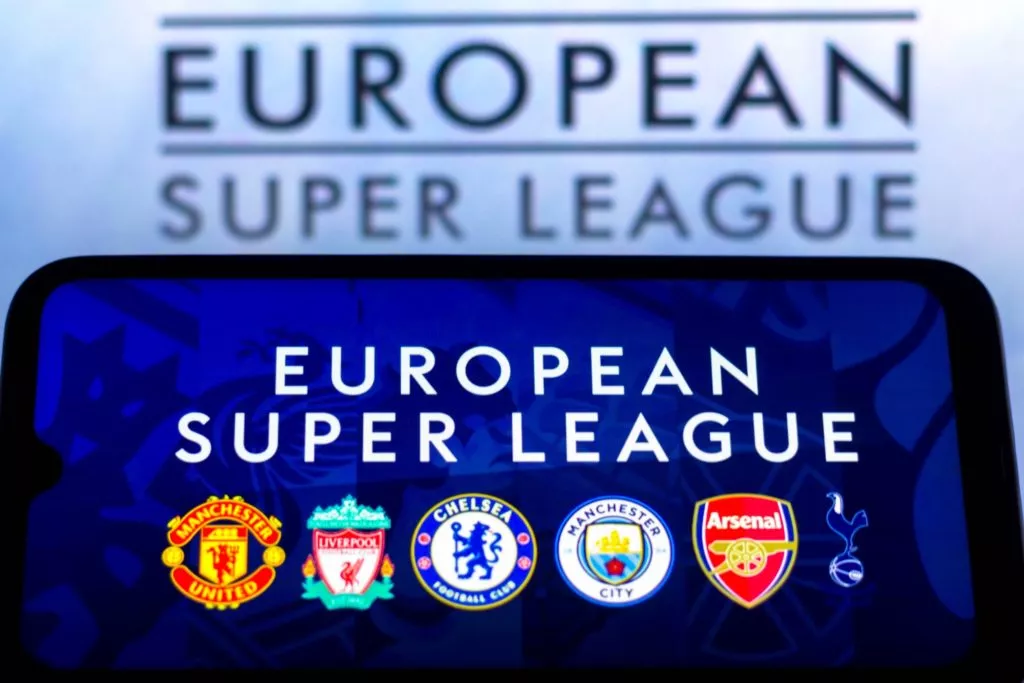It’s a case of “if at first you don’t succeed,” as exponents of the European Super League (ESL) refuse to give up the ghost.
After they were forced to beat a hasty retreat in 2021, the drivers of the proposal dusted themselves down and have now returned for another skirmish, this time hoping to win not only the battle but also the war.
The initial proposal was roundly criticised as “anti-football” and summarily rejected by all and sundry. The contempt for its exponents was palpable. It was difficult to see a way back for the much-reviled idea.
Credit goes to those advocating for it for mustering the courage to go back to the drawing board. They were defeated but by no means disembowelled. They have now returned armed with a variation they hope will be more palatable to the sensibilities of European football authorities and fans.
The new ELS format
There are significant differences, especially around the format, between the initial and the revamped proposal.
The original proposal, which drew the ire of many, was for an exclusive club of 12 top European clubs with permanent seats at the lavish table they sought to prepare for themselves as the founders. Five seats were reserved for “guests” who merited invitations. The group of 12 was exempt from relegation from the exclusive club.
By contrast, the remixed version of the proposal claims to be based on egalitarian principles and meritocracy. The new format would include 60 to 80 teams with no permanent members. Each team would be guaranteed a minimum of 14 matches per season while continuing to play in their domestic leagues.
Exactly how the scheduling of matches would work is not clear. With UEFA’s three club competitions and the national leagues’ own domestic league and cup competitions, players are already panting under a heavy workload.
To be fair, it’s a significant alteration to the original elitist proposal, but will it make a difference to attitudes towards the idea of a European Super League?
Old wine in new skins
Early indications are that the rebooted version will suffer the same fate as the original. It faces a resounding rejection at the polls of public opinion.
The re-imagined format is enveloped in the lingering stench emitted by the original proposal. It is tainted by the founding idea. It will take something ridiculously special for the ESL to recover from its fatal opening gambit.
The revised proposal is unlikely to see the light of day because many view it as old wine in new wine skins. The wine is still not agreeable with the imbibers’ palates. They will not be seduced by the new packaging.
Old fears and misgivings remain; the ESL can’t prosper without destroying football as we know it. It can’t flourish without impoverishing the existing European leagues. It will not only enhance the current UEFA club competitions but also threaten their very existence.
The new ESL proposal is a hard sell, and preliminary indications are that there will be no serious takers. The revisions are as significant as a snake shedding it’s skin. The serpent does not lose it’s venom after shedding.
The European Super League manifesto
Some of the ESL propaganda is straight from the “adapt-or-die” manual. It’s alarmist too. Exponents argue that there is an urgent need for European football to reinvent itself or face extinction. The narrative is persuasive but sounds rehearsed.
Detractors are not swayed by this ‘mock’ concern for the future of the beautiful game. They will point out that UEFA is actually constantly seeking to improve its club competitions, from the money-spinning Champions League to the Europa League and the Europa Conference League. So, UEFA has actually pulled the “reinvention” agenda from under the ESL’s feet.
It remains to be seen whether the original co-conspirators, the clubs that jumped ship at the first sign of trouble in 2021 – Arsenal, Chelsea, Liverpool, Manchester United, Manchester City, Tottenham, Atletico Madrid and Serie A duo AC Milan and Inter Milan – will clamber back onto what is still a troubled ship in choppy waters despite the fixes effected. After all, the clubs are still smarting from the excoriation after fans made their feelings clear in 2021 that no way was the project going to be carried out in their clubs’ names.
Barcelona, Real Madrid and Juventus are still holding on forlornly to the idea, the former two despite vehement opposition from their home league. As for Juventus, well, they have problems of their own which saw them docked 15 points. They are hardly the ideal face for a new offering espousing the virtues of integrity.
The case for the ESL
A22 Sports Management, the agency promoting and making the case for a revamped ESL has their work cut out for them. At this moment, it looks like the European Club Association (ECA) is in league with UEFA. It will take some serious work behind the scenes for ESL promoters to convince the ECA that they are better off rebelling against UEFA and throwing their lot with the proposed new ESL.
The strategy, it seems, is to paint UEFA as a parasite subsisting on the blood and sweat of voiceless European clubs.
A22 chief executive Bernd Reichart told German newspaper Die Welt: “The foundations of European football are in danger of collapsing.
“It’s time for a change. It is the clubs that bear the entrepreneurial risk in football.
“But when important decisions are at stake, they are too often forced to sit idly by on the sidelines as the sporting and financial foundations crumble around them.”
As part of their charm offensive, A22 are sanctimoniously projecting UEFA as an oppressive regime, cowing clubs into silence. In contrast, the ESL would be everything UEFA is not.
Decrying UEFA’s predisposition to crackdown on any form of dissent, Reichart uses language often reserved for chastising despotic or rogue political regimes.
“Our talks have also made it clear that clubs often find it impossible to speak out publicly against a system that uses the threat of sanctions to thwart opposition,” Reichart said.
What odds the new ESL format?
The football community’s reception of the new format has been just as hostile as it was to the original. The new proposal is being pushed back with the same level of brutality meted out to the initial idea.
The ESL project looks every inch like an exercise in futility, an idea beyond rehabilitation. It is set to be given short shrift, again effectively paying for the sins of its utterly detestable forerunner.
The promoters of the idea have their work cut out for them. They are hiding for nothing, selling an unsellable product.






